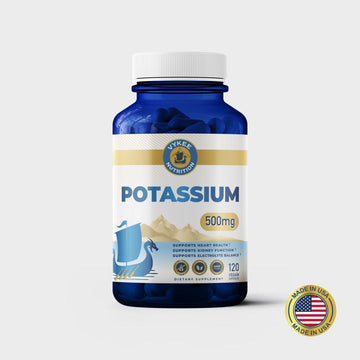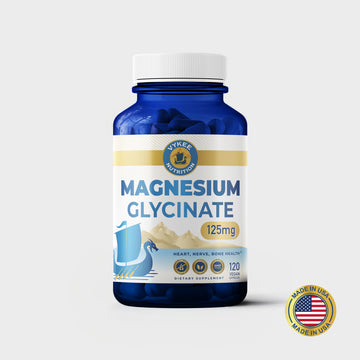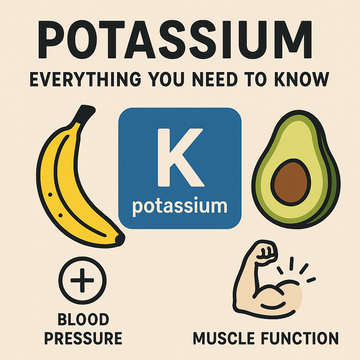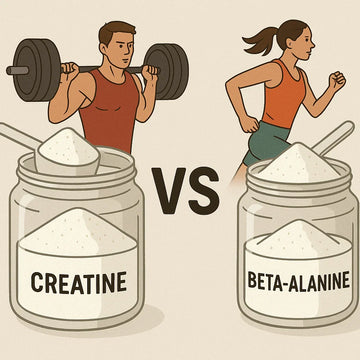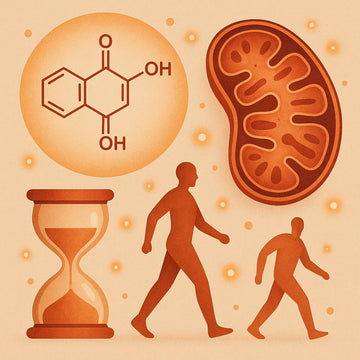When it comes to nutrients essential for your well-being, potassium often doesn’t get the attention it deserves. This mighty mineral is crucial for many of your body’s key functions, from regulating fluid balance to supporting heart health and muscle function. In fact, potassium plays a role in over 300 cellular processes—making it a vital nutrient for optimal health.
Whether you’re looking to boost energy, maintain a healthy heart, or improve exercise performance, understanding potassium’s benefits is the first step in optimizing your nutrition. Here’s everything you need to know about this essential mineral.
What is Potassium and Why Is It Important?
Potassium is an electrolyte—a mineral that carries an electrical charge in the body and helps maintain fluid balance, nerve function, and muscle contractions. Unlike some minerals that are primarily stored in bones, potassium is largely found inside your cells, helping to regulate the activity of your muscles and nerves.
Potassium also supports:
-
Healthy blood pressure levels: By balancing sodium levels in your body, potassium helps keep your blood pressure in check.
-
Muscle function: It aids in muscle contraction, which is key for movement and preventing cramps.
-
Heart health: Potassium regulates the electrical activity of your heart, keeping it beating at a steady rhythm.
How Much Potassium Do You Need?
The recommended daily intake (RDI) of potassium varies by age and gender:
-
Adults typically need 2,500–3,400mg of potassium per day.
-
Pregnant and breastfeeding women may need more to support the extra fluid and nutrient demands.
Despite the importance of potassium, most people do not meet the recommended intake. According to the National Institutes of Health (NIH), only 2% of Americans get the recommended daily amount of potassium, which can lead to a range of health issues.
Top Health Benefits of Potassium
1. Supports Heart Health
Potassium is key to keeping your heart beating at a steady pace. It helps regulate the electrical signals that control your heart’s rhythm. Research has shown that a high potassium intake can help reduce blood pressure and decrease the risk of stroke, while also contributing to overall heart health by preventing irregular heartbeats (arrhythmia).
If you’re looking for supplements that support cardiovascular wellness, check out Vykee’s Heart Health collection.
2. Regulates Fluid Balance
Potassium is crucial in maintaining fluid balance within your cells, tissues, and organs. It helps ensure that your body maintains the correct levels of fluid in your blood vessels and tissues. This is particularly important for hydration, preventing both dehydration and overhydration.
3. Reduces Muscle Cramps and Promotes Healthy Muscle Function
Potassium plays a significant role in muscle function by facilitating nerve communication and muscle contractions. Low potassium levels can lead to muscle weakness, cramps, and even paralysis in extreme cases. Adequate potassium intake helps prevent muscle cramps, particularly in athletes and active individuals who lose electrolytes through sweat.
Vykee’s Sports Nutrition collection offers supplements that support muscle function and recovery.
4. Aids in Weight Management
Potassium’s role in fluid balance also impacts your weight management. By helping regulate the body's fluid retention, potassium can reduce bloating and promote a healthier metabolism. In addition, studies have shown that potassium can help reduce insulin resistance, which can contribute to weight loss and management by improving fat metabolism.
How to Get More Potassium in Your Diet
Potassium is abundant in many foods, especially fruits, vegetables, legumes, and dairy products. Here are some excellent food sources of potassium:
-
Bananas: One of the most well-known sources of potassium, with about 400-450mg per banana.
-
Sweet Potatoes: A medium-sized sweet potato contains around 500mg of potassium.
-
Spinach: One cup of cooked spinach provides over 800mg of potassium.
-
Avocados: Rich in healthy fats and potassium, one avocado contains over 900mg of potassium.
-
Legumes: Beans, lentils, and peas are all great sources of potassium, with about 500mg per serving.
If you’re not getting enough potassium through food, supplements can help. Vykee offers clean, high-quality Vitamins & Minerals supplements that support your daily potassium needs.
Signs of Potassium Deficiency
While potassium deficiency is rare in healthy individuals with a balanced diet, it can occur due to factors like dehydration, excessive alcohol consumption, or certain medications like diuretics. Some common signs of potassium deficiency include:
-
Muscle cramps or weakness
-
Fatigue or low energy levels
-
Irregular heart rhythms
-
Constipation or bloating
-
High blood pressure
If you suspect a deficiency, consider increasing your potassium intake through diet or supplements. Always consult a healthcare provider if you experience symptoms.
Potassium and Blood Pressure: The Connection
The relationship between potassium and blood pressure is well-documented in scientific literature. Potassium helps counterbalance the effects of sodium, a major contributor to high blood pressure. A study published in the Journal of Clinical Hypertension found that increasing potassium intake significantly lowered systolic blood pressure in people with high blood pressure.
A potassium-rich diet, coupled with regular exercise and a balanced lifestyle, is a natural way to manage and maintain healthy blood pressure.
Potassium Supplements: When Should You Consider Them?
While it’s always best to get your nutrients from food, potassium supplements can be beneficial for individuals with certain medical conditions, those on diuretics, or those who struggle to get enough potassium through diet alone. When choosing a potassium supplement, look for products that provide potassium in its most bioavailable form—such as potassium citrate or potassium gluconate.
If you're considering a potassium supplement, check out Vykee’s Vitamins & Minerals collection to find the right potassium supplement tailored to your health needs.
Conclusion
Potassium is an essential mineral that supports everything from heart health to muscle function to fluid balance. Despite its importance, many people don’t get enough potassium through their diet, which can lead to a range of health issues, including high blood pressure, muscle cramps, and fatigue. Ensuring you get enough potassium—either through food or supplements—is a simple yet powerful way to support your overall health and wellness.
Explore Vykee’s Vitamins & Minerals collection to start supporting your potassium intake and enjoy the benefits of this essential mineral today.
